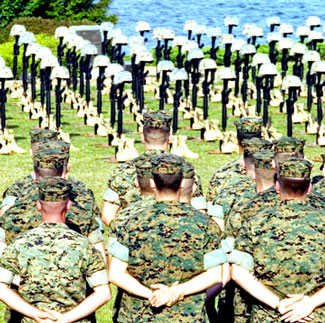- Casualties in Iraq; The Human Cost of Occupation (Antiwar.com)
- Life in ‘liberated’ Iraq a disaster, UN report says (FCN, 06-01-2005)
- Military recruitment down: Blacks silently protest war (FCN, 04-06-2005)
- Neo-Cons and the Motive for Iraq War (Minister Louis Farrakhan, 05-03-2004)

WASHINGTON (FinalCall.com) – In addition to a high rate of suicides among U.S. troops, brutal atrocities they are now accused of committing in Iraq could be a consequence of the military’s deployment into combat of mentally unfit soldiers with severe psychological problems.
“I would think that it is very likely that the military would ignore the mental health fitness of individuals for any number of reasons,” Dr. Pamela Brewer, a psychologist and social worker, and host of Pacifica Radio’s “MyndTalk,” told The Final Call. “And if the person who was evaluating them is pre-disposed to seeing people ‘healthy enough to fight’–which is sort of an oxymoron in and of itself–then that’s how they will be seen, healthy.”
U.S. troops with severe psychological problems have been sent to Iraq or kept in combat there, even when superiors have observed signs of mental illness, The Hartford Courant reported May 14. Citing records obtained under the Freedom of Information Act, and more than 100 interviews of families and military personnel, the newspaper reported numerous cases in which the military failed to follow its own regulations in screening, treating and evacuating mentally unfit troops from Iraq.
“When you don’t know what the face of the enemy is, when they’re going to attack, what their mode of attack is, I think it puts everyone on a hair-trigger alert,” Eric Leaver, a research fellow at the Institute for Policy Studies, told The Final Call. “If you feel that your life is in danger, rightly or wrongly, people have been quick to the trigger, and this is just one of the many incidents,” he said of reports that U.S. Marines shot 24 Iraqi civilians, men, women and children at close range in the town of Haditha in retaliation for the death of a Marine in a roadside bombing.
Actions by U.S. forces are a major cause of Iraqi civilian deaths. “Looking at the Iraq body-count website, if you look at civilian deaths that have been a result of U.S. actions, almost a third of the total Iraqi civilian casualties have been caused by the U.S.,” said Mr. Leaver.
Citing Pentagon statistics, the newspaper said fewer than one in 300 service members were referred to a mental health professional before being sent to Iraq as of October 2005. Twenty-two U.S. troops committed suicide in Iraq in 2005, the newspaper said. Some service members who committed suicide in 2004 and 2005 were also kept on duty despite clear signs of mental distress. In some cases, they had been prescribed antidepressants with little or no health counseling or monitoring.

(Right Photo) Sargeant Alejandro Delaluz of the Army Reserve 379th Chemical Company holds back his emotions Feb. 4, 2005 as he hugs his two-year-old son Alexander during a welcome-home ceremony in Arlington Heights, Ill. The 379th had been deployed in Kuwait for over a year.
“I can’t imagine something more irresponsible than putting a soldier suffering from stress on (antidepressants), when you know these drugs can cause people to become suicidal and homicidal,” said Vera Sharav, president of the Alliance for Human Research Protection, a New York-based advocacy group. “You’re creating chemically activated time bombs.”
“There should be more evaluation within the field. The amount of mental health professionals that are on the ground to do real-time monitoring is very low,” said Mr. Leaver. “Given the stress that soldiers are in, there should be a lot more. The military should be paying a lot more attention to it. It’s hard because soldiers, when they’re on the ground, don’t want to be seen as being weak. There’s this general stigma attached to mental illness. Soldiers aren’t often wanting to pro-actively seek treatment.”
Dr. Brewer agrees. “For those soldiers who are in the war, when they do have difficulties, there’s still a stigma. So, if you’re having a bad time, the worse time you’re having, the less likely you are to say something to someone, because the scarier it is for you and you don’t want to be ostracized by your fellow colleagues.”
The Army’s top mental health expert, Col. Elspeth Ritchie, told the newspaper that some deployment practices, such as sending service members diagnosed with post-traumatic stress syndrome, back into combat have been driven by a shortage of troops.
“The challenge for us is that the Army has a mission to fight. And, as you know, recruiting has been a challenge,” she said. “And so we have to weigh the needs of the Army, the needs of the mission, with the soldiers’ personal needs.”
Commanders, not medical professionals, have final say over whether a troubled soldier is retained in the war zone. Col. Ritchie and other military officials told the newspaper they believe commanders are alert to mental health problems.
“Your average commander doesn’t want to deal with a whacked-out soldier,” explained Maj. Andrew Efaw, a Judge Advocate General officer in the Army Reserves, who handled trial defense for soldiers in Northern Iraq last year. “But on the other hand, he doesn’t want to send a message to his troops that if you act up, he’s willing to send you home.”












